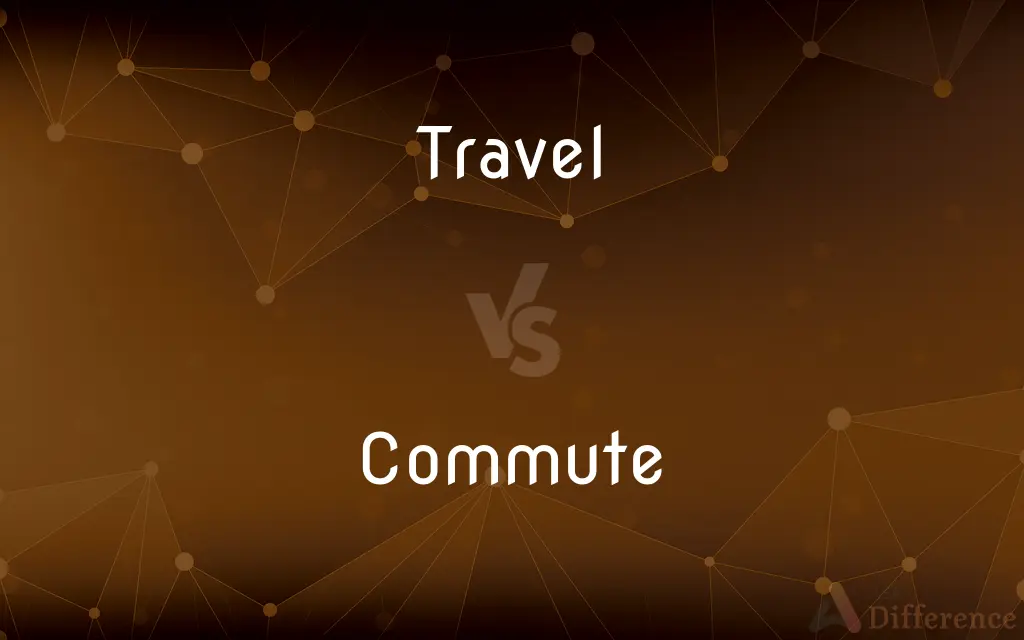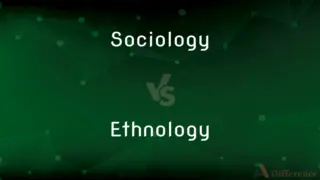Travel vs. Commute — What's the Difference?
Edited by Tayyaba Rehman — By Fiza Rafique — Updated on September 28, 2023
Travel refers to moving from one place to another, often over longer distances or for leisure, while Commute typically means a regular journey between home and work or school.

Difference Between Travel and Commute
Table of Contents
ADVERTISEMENT
Key Differences
Travel and Commute are both verbs related to movement, but their contexts and implications differ. Travel generally indicates movement from one location to another, which can be for various reasons such as vacation, business, or exploration. On the other hand, Commute is more specific, usually signifying a repeated trip, like from home to work and vice versa.
While people Travel to discover new places, experience different cultures, or accomplish business goals, they Commute as part of their routine, usually out of necessity. Travelling might involve packing bags, booking tickets, and staying overnight. Commuting, conversely, often involves daily schedules, familiar routes, and no need for extensive planning.
Travel can be both short and long-haul, encompassing everything from a weekend getaway to months-long expeditions. Commute, though, typically involves shorter distances, covering the span between a person's residence and their regular destination like an office or school.
Comparison Chart
Purpose
Leisure, business, exploration, etc.
Regular journey between home and work/school.
Duration
Can vary from short to long durations.
Typically daily and short-term.
ADVERTISEMENT
Planning
Often involves planning, bookings, and packing.
Routine, often with a set schedule.
Distance
Can be both short and long distances.
Usually shorter, specific distances.
Emotion
Excitement, relaxation, curiosity.
Routine, possibly monotonous or stressful.
Compare with Definitions
Travel
Moving from one place to another.
He loves to Travel around the world.
Commute
Traveling regularly between home and work or school.
His daily Commute takes an hour each way.
Travel
Exploring different geographical locations.
They decided to Travel across Europe by train.
Commute
Exchanging one kind of payment or charge for another.
She will Commute the lump sum into monthly payouts.
Travel
Engaging in the act of touring.
The couple plans to Travel this summer.
Commute
Changing a penalty to a less severe one.
The governor decided to Commute his sentence.
Travel
Travel is the movement of people between distant geographical locations. Travel can be done by foot, bicycle, automobile, train, boat, bus, airplane, ship or other means, with or without luggage, and can be one way or round trip.
Commute
Reducing the duration of a journey.
The new train line will Commute travel time by 30 minutes.
Travel
Make a journey, typically of some length
We travelled thousands of miles
The vessel had been travelling from Libya to Ireland
Commute
Transforming something into a different form or medium.
He will Commute his ideas into a full-fledged novel.
Travel
(of an object or radiation) move, typically in a constant or predictable way
Light travels faster than sound
Commute
To travel as a commuter
She commuted each day to her office downtown by subway.
Travel
Take more than the allowed number of steps (typically two) while holding the ball without dribbling it.
Commute
To make substitution or exchange.
Travel
The action of travelling
My job involves a lot of travel
Commute
To serve as a substitute.
Travel
The range, rate, or mode of motion of a part of a machine
Two proximity switches detect when the valve has reached the end of its travel
Commute
To pay in gross, usually at a reduced rate, rather than in individual payments.
Travel
To go from one place to another, as on a trip; journey.
Commute
Mathematics & Logic To satisfy a commutative property. If a × b = b × a, then a commutes with b, regardless of whether the operation indicated by × is commutative.
Travel
To go from place to place as a salesperson or agent.
Commute
To substitute (one thing for another); exchange.
Travel
To move or pass, as from one person to another
Reports of the king's death traveled from village to village.
Commute
To change (a penalty, debt, or payment) to a less severe one.
Travel
To be transmitted, as light or sound
The speed at which sound travels through water.
Commute
An act or instance of commuting, especially the trip made by a commuter
A 22-mile commute.
An easy commute.
Travel
To move along a course, as a phonograph needle in the groove of a record.
Commute
To exchange substantially; to abate but not abolish completely, a penalty, obligation, or payment in return for a great, single thing or an aggregate; to cash in; to lessen
To commute tithes into rentcharges for a sum
To commute market rents for a premium
To commute daily fares for a season ticket
Travel
(Informal) To move swiftly
This car can really travel.
Commute
To pay, or arrange to pay, in advance, in a lump sum instead of part by part.
To commute the daily toll for a year's pass
Travel
To go about in the company of a particular group; associate
Travels in wealthy circles.
Commute
To reduce the sentence previously given for a criminal offense.
His prison sentence was commuted to probation.
Travel
To admit of being transported without loss of quality; Some wines travel poorly.
Commute
To pay out the lumpsum present value of an annuity, instead of paying in instalments; to cash in; to encash
Travel
(Basketball) To move illegally while holding the ball, usually by taking more than two steps between dribbles or by moving a foot that has been established as a pivot.
Commute
To obtain or bargain for exemption or substitution;
Travel
To pass or journey over or through; traverse
Travel the roads of Europe.
Commute
Of an operation, to be commutative, i.e. to have the property that changing the order of the operands does not change the result.
A pair of matrices share the same set of eigenvectors if and only if they commute.
Travel
The act or process of traveling from one place to another
With the railroad, travel between cities became swift.
Commute
To regularly travel from one's home to one's workplace or school, or vice versa.
I commute from Brooklyn to Manhattan by bicycle.
Travel
A series of journeys
Her travels in Africa.
Commute
To regularly travel from one place to another using public transport.
Travel
An account of one's journeys.
Commute
(intransitive) To journey, to make a journey
Travel
The activity or business of arranging trips or providing services for travelers
She works in travel.
Commute
A regular journey between two places, typically home and work.
Travel
Movement or passage
The travel of the planets around the sun.
Commute
The route, time or distance of that journey.
Travel
The motion of a piece of machinery, especially of a reciprocating part; stroke.
Commute
To exchange; to put or substitute something else in place of, as a smaller penalty, obligation, or payment, for a greater, or a single thing for an aggregate; hence, to lessen; to diminish; as, to commute a sentence of death to one of imprisonment for life; to commute tithes; to commute charges for fares.
The sounds water and fire, being once annexed to those two elements, it was certainly more natural to call beings participating of the first "watery", and the last "fiery", than to commute the terms, and call them by the reverse.
The utmost that could be obtained was that her sentence should be commuted from burning to beheading.
Travel
The length of a mechanical stroke.
Commute
To obtain or bargain for exemption or substitution; to effect a commutation.
He . . . thinks it unlawful to commute, and that he is bound to pay his vow in kind.
Travel
(intransitive) To be on a journey, often for pleasure or business and with luggage; to go from one place to another.
John seems to spend as much time travelling as he does in the office.
Commute
To pay, or arrange to pay, in gross instead of part by part; as, to commute for a year's travel over a route.
Travel
(intransitive) To pass from one place to another; to move or transmit
Soundwaves can travel through water.
The supposedly secret news of Mary's engagement travelled quickly through her group of friends.
Commute
To travel regularly from a place of residence to another place, such as where one's daily work is performed. Often, such travel is performed between a suburb and a nearby city; as, to commute to work.
Travel
To move illegally by walking or running without dribbling the ball.
Commute
Transpose and remain equal in value;
These operators commute with each other
Travel
(transitive) To travel throughout (a place).
I’ve travelled the world.
Commute
Travel back and forth regularly, as between one's place of work and home
Travel
(transitive) To force to journey.
Commute
Change the order or arrangement of;
Dyslexics often transpose letters in a word
Travel
(obsolete) To labour; to travail.
Commute
Exchange a penalty for a less severe one
Travel
The act of traveling; passage from place to place.
Space travel
Travel to Spain
Commute
Exchange or replace with another, usually of the same kind or category;
Could you convert my dollars into pounds?
He changed his name
Convert centimeters into inches
Convert holdings into shares
Travel
(in the plural) A series of journeys.
I’m off on my travels around France again.
Travel
(in the plural) An account of one's travels.
He released his travels in 1900, two years after returning from Africa.
Travel
The activity or traffic along a route or through a given point.
Travel
The working motion of a piece of machinery; the length of a mechanical stroke.
There was a lot of travel in the handle, because the tool was out of adjustment.
My drill press has a travel of only 1.5 inches.
Travel
(obsolete) Labour; parturition; travail.
Travel
Distance that a keyboard's key moves vertically when depressed.
The keys have great travel.
Travel
To labor; to travail.
Travel
To go or march on foot; to walk; as, to travel over the city, or through the streets.
Travel
To pass by riding, or in any manner, to a distant place, or to many places; to journey; as, a man travels for his health; he is traveling in California.
Travel
To pass; to go; to move.
Time travels in divers paces with divers persons.
Travel
To journey over; to traverse; as, to travel the continent.
Travel
To force to journey.
They shall not be traveled forth of their own franchises.
Travel
The act of traveling, or journeying from place to place; a journey.
With long travel I am stiff and weary.
His travels ended at his country seat.
Travel
An account, by a traveler, of occurrences and observations during a journey; as, a book of travels; - often used as the title of a book; as, Travels in Italy.
Travel
The length of stroke of a reciprocating piece; as, the travel of a slide valve.
Travel
Labor; parturition; travail.
Travel
The act of going from one place to another;
He enjoyed selling but he hated the travel
Travel
A movement through space that changes the location of something
Travel
Self-propelled movement
Travel
Change location; move, travel, or proceed;
How fast does your new car go?
We travelled from Rome to Naples by bus
The policemen went from door to door looking for the suspect
The soldiers moved towards the city in an attempt to take it before night fell
Travel
Undertake a journey or trip
Travel
Make a trip for pleasure
Travel
Travel upon or across;
Travel the oceans
Travel
Undergo transportation as in a vehicle;
We travelled North on Rte. 508
Travel
Travel from place to place, as for the purpose of finding work, preaching, or acting as a judge
Travel
Undertaking a journey for leisure or business.
Her job requires her to Travel frequently.
Travel
Passing or being transported in space or time.
Light can Travel faster than sound.
Common Curiosities
Can Travel be a short distance?
Yes, Travel can cover both short and long distances.
What is the main purpose of Travel?
Travel can be for leisure, business, exploration, or other reasons.
Is Commute a type of Travel?
Yes, Commute is a routine type of Travel, usually between home and work or school.
Why do people Travel?
People Travel for various reasons such as leisure, business, exploration, or personal needs.
How can one make their Commute more productive?
By listening to podcasts, audiobooks, or even using public transport to work or study.
How has technology influenced Travel?
Technology has made Travel easier through online bookings, digital maps, and instant translations.
What is the typical duration of a Commute?
A Commute is often daily, covering short-term durations.
Which requires more planning, Travel or Commute?
Travel usually requires more planning, while Commuting is more routine.
Is Travel always recreational?
No, people can Travel for business, emergencies, or other non-recreational reasons.
Is Commuting always by car?
No, Commuting can be done by various means like bus, train, bike, on foot, or even carpooling.
What is a long Commute considered?
Generally, a Commute over an hour one way is considered long, but it varies by region and personal tolerance.
What are common modes of Travel?
Common modes include planes, trains, buses, cars, bikes, and on foot.
Can Commute be enjoyable?
Yes, some people find their Commute relaxing or use it as personal time.
Can Travel be virtual?
Yes, with advancements in technology, virtual Travel experiences through VR and online platforms have become popular.
Does Commute always refer to traveling?
No, it can also mean changing a penalty or exchanging one type of payment for another.
Share Your Discovery

Previous Comparison
Sociology vs. Ethnology
Next Comparison
Stably vs. SteadilyAuthor Spotlight
Written by
Fiza RafiqueFiza Rafique is a skilled content writer at AskDifference.com, where she meticulously refines and enhances written pieces. Drawing from her vast editorial expertise, Fiza ensures clarity, accuracy, and precision in every article. Passionate about language, she continually seeks to elevate the quality of content for readers worldwide.
Edited by
Tayyaba RehmanTayyaba Rehman is a distinguished writer, currently serving as a primary contributor to askdifference.com. As a researcher in semantics and etymology, Tayyaba's passion for the complexity of languages and their distinctions has found a perfect home on the platform. Tayyaba delves into the intricacies of language, distinguishing between commonly confused words and phrases, thereby providing clarity for readers worldwide.















































